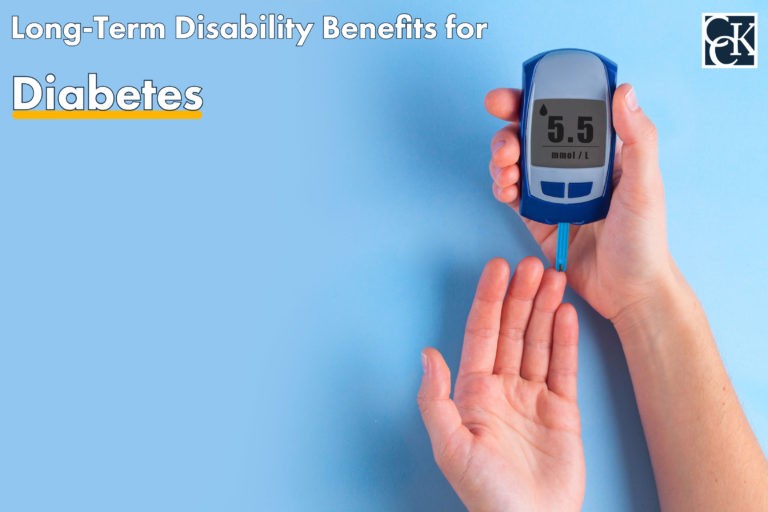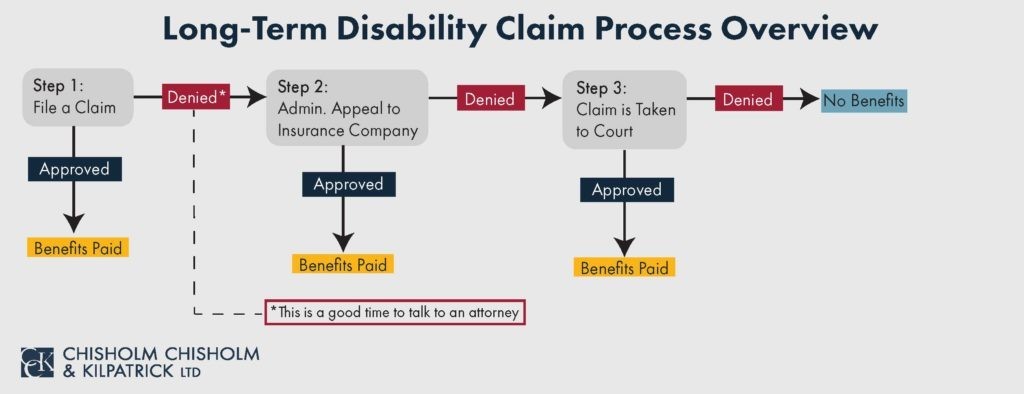Getting Long-Term Disability (LTD) Benefits for Diabetes

Diabetes is among the most common diseases in America. According to the CDC, about 1 in 10 Americans have diabetes, and nearly 1 in 3 are at risk. Put simply, it is a disease in which your body is unable to correctly convert the sugars from the food you eat into energy for your cells. If uncontrolled, it can cause severely disabling side effects, and can even be life-threatening.
If you live with diabetes and find that your symptoms are affecting your ability to work, you may be eligible to make a claim for long-term disability (LTD) benefits. At Chisholm Chisholm & Kilpatrick, we have the experience to help you make a strong case to receive long-term disability benefits.

What is Diabetes?
There are many incorrect generalizations that often surround diabetes, including that it is simply caused by overindulging on sugary treats, which can lead to gross misunderstandings of how the disease works or is caused. In truth, diabetes can be the result of several factors.
There are two main types of diabetes, type 1 and type 2, and while these types differ, both are caused by the body incorrectly producing or responding to the hormone insulin. Insulin, which is created by the pancreas, is responsible for converting the glucose sugar from the food you eat into energy for your cells. Without sufficient insulin, or if your body stops responding correctly to insulin, excess sugar builds up in your blood. This can lead to high blood sugar, which can have dangerous side effects such as heart disease, nerve damage, stroke, and other serious health conditions.
Type 1 Diabetes
Type 1 diabetes is an autoimmune disease, which means your immune system, which protects against viruses and bacteria, wrongly attacks your body’s healthy cells. Type 1 diabetes occurs when the body’s immune system mistakenly attacks and destroys the cells in the pancreas that produce insulin. As a result, your body is left with little or no insulin at all. Once diagnosed, this condition is a lifelong chronic illness that one must manage with daily insulin injections and regular blood sugar monitoring.
Type 1 diabetes is most commonly diagnosed in children and adolescents but can occur at any time in life. The exact cause of type 1 is not known, but it is thought to be a combination of genetic predisposition and environmental factors. It is not caused by an unhealthy diet, or anything you necessarily “do” regarding your health.
Type 2 Diabetes
Type 2 diabetes occurs when your body’s cells become resistant to insulin. Your pancreas is not able to produce enough insulin to overcome this resistance, which leads to a buildup of glucose sugar in your blood. This can force your pancreas to work harder to produce insulin, which in turn damages its insulin cells. Over time, your pancreas may lose the ability to produce insulin.
Type 2 diabetes most commonly occurs in middle-aged or older individuals, and several factors can contribute to the onset of type 2. Like type 1, genetic predisposition toward diabetes plays a large role. The development of type 2 diabetes can also be contributed to being overweight with a body type that holds fat around the stomach area of the body in particular. An inactive lifestyle, smoking habits, and poor sleep also can contribute to onset. High blood pressure has also been linked to insulin resistance, and it is generally a combination of such factors that lead to type 2 diabetes. It is sometimes possible to reverse a type 2 diagnosis if you make healthy lifestyle changes.
Women who have had gestational diabetes are also at higher risk of developing type 2. Gestational diabetes occurs when a woman is pregnant, but generally goes away once the baby is born.
Symptoms of Diabetes
Both types of diabetes share the same symptoms. The most significant difference between symptoms for type 1 and type 2 is generally how quickly the symptoms occur. For a person with type 1, symptoms may occur over a short period of time and can be severe. Type 2 diabetes symptoms may develop slowly and can worsen over a longer period of time. It can take months or even years before type 2 diabetes is identified. The severity of symptoms can depend on how elevated blood sugar levels are.
Symptoms of diabetes include:
- Increased thirst
- Frequent urination
- Unexplained weight loss
- Extreme hunger
- Impaired vision
- Fatigue
- Numbness or tingling of the hands or feet
- Slow-healing sores or injuries
- Frequent infections
Diagnosis and Treatment
Diabetes is often diagnosed through blood tests. These tests may measure blood sugar in different ways, at random or after a period of fasting. You may also take a glucose tolerance test, in which you drink a sugary liquid and your blood sugar levels are tested periodically over the course of two to three hours. You may also be required to take urine tests, especially if type 1 diabetes is suspected.
Treatment for type 1 diabetes consists of daily insulin shots or the use of an insulin pump, which injects insulin automatically and is worn by the user. Type 1 diabetes can be fatal if insulin is not injected daily.
Treatment for type 2 diabetes can vary depending on the severity and the particularities of your condition. Treatment for type 2 can primarily revolve around lifestyle changes, such as weight loss, healthy eating, exercise, and kicking habits such as smoking. Medications may be prescribed that can stimulate the pancreas to produce more insulin or inhibit your liver’s production of glucose to lower your blood sugar. Insulin injections may also be needed if diabetes is in a more advanced stage, but they are not always required with type 2. In both types of diabetes, blood sugar must be monitored daily.
Long-Term Disability and the Effects of Diabetes
The symptoms of diabetes can be disabling even if your diabetes is controlled through treatment. Managing insulin intake can be tricky and balancing glucose levels can lead to symptoms of dizziness, fatigue, and nausea even for those experienced in managing their diabetes.

If uncontrolled or advanced, diabetes can lead to a slew of further disabling health complications. Every part of the body depends on the nourishment of our blood, and when that is disrupted, our nerves and organs suffer. Health conditions that can result from diabetes can include:
- Diabetic neuropathy (nerve damage, often in legs and feet)
- Diabetic retinopathy (Impaired vision or blindness)
- Heart disease
- Stroke
- Kidney disease
- Diabetic coma
- Amputation
- Dementia and Alzheimer’s disease
Diabetes is a complex disease that can encompass many side effects. Nerve damage, organ failure, vision impairments, and brain ailments can disable you from performing many physical or cognitive occupations. Complications that come with stabilizing your blood sugar may require you to take time out of work or miss work for doctor’s appointments. All of these side effects are cause to apply for disability benefits.
If you are unable to work due to your diabetes and any of its resulting conditions, you might qualify for long-term disability benefits. You will want to provide evidence of all disabling conditions you suffer for your long-term disability claim so that you have the strongest case possible.
How Chisholm Chisholm & Kilpatrick Can Help You with Your Long-Term Disability Claim
Our long-term disability attorneys at Chisholm Chisholm & Kilpatrick have experience helping claimants with disability cases for diseases such as diabetes. If you are trying to juggle a long-term disability claim and manage your condition at the same time, it can be beneficial to seek the help of a lawyer. We want you to be able to focus on your health without the worry of applying for long-term disability benefits.

Whether you are filing your initial claim or seeking to appeal a denial of benefits, CCK knows how to fight for your case. Our attorneys will gather the evidence and medical records that prove your diabetes, as well as any additional health conditions stemming from it. We will handle the communication with your doctors, the insurance company, and any other additional experts who can help you prove that you are unable to perform the duties of your profession.
Insurance companies can be difficult to work with and may prioritize their own business needs over the needs of claimants. Insurance policies can be detailed and sometimes difficult to satisfy, such as an own vs. any occupation policy, but CCK attorneys know how to work with challenging insurance companies to get you the benefits to which you are entitled.
Chisholm Chisholm & Kilpatrick will work with you to make sure you understand how your claim is being handled every step of the way. We want you to be able to take care of yourself and your diabetes while we handle your long-term disability claim or appeal. If you would like a free consultation regarding your LTD claim, you can contact us at 800-544-9144 today.
Share this Post
